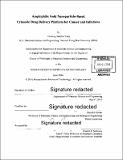| dc.contributor.advisor | Darrell J. Irvine. | en_US |
| dc.contributor.author | Yang, Yu-Sang Sabrina | en_US |
| dc.contributor.other | Massachusetts Institute of Technology. Department of Materials Science and Engineering. | en_US |
| dc.date.accessioned | 2016-09-13T19:10:11Z | |
| dc.date.available | 2016-09-13T19:10:11Z | |
| dc.date.copyright | 2016 | en_US |
| dc.date.issued | 2016 | en_US |
| dc.identifier.uri | http://hdl.handle.net/1721.1/104187 | |
| dc.description | Thesis: Ph. D., Massachusetts Institute of Technology, Department of Materials Science and Engineering, 2016. | en_US |
| dc.description | Cataloged from PDF version of thesis. | en_US |
| dc.description | Includes bibliographical references (pages 150-155). | en_US |
| dc.description.abstract | Cancer progression relies on deregulation of normal immune cell functions. One of the signature strategies utilized by tumor cells is immunosuppression. Deregulation of cytosolic kinases negatively alters immune cell signaling, proliferation, differentiation, and migration. Small molecule kinase inhibitors offer unique opportunities to enhance anti-tumor immunity by inhibition of immunosuppressive kinases. However, potent inhibitors are often poorly soluble in physiological conditions and suffer from poor pharmacokinetics in vivo. In this thesis we designed a small molecule cytosolic delivery platform based on cell-penetrating amphiphilic nanoparticles (amph-NPs), which are capable of embedding within and subsequently penetrating cell membranes without toxicity. Amph-NPs have dual properties of entrapping concentrated hydrophobic small molecules in their ligand shells and preferentially targeting lymph nodes post subcutaneous injection. Successful reversal of immunosuppression in T cells via diacylglycerol kinase inhibitors (DGKi) was achieved via amph-NP delivery, while DGKi delivered in its soluble form was ineffective. A hydrophobic small molecule antimicrobial ciprofloxacin loaded in amph-NPs resulted in early clearance of local bacterial infection, while ciprofloxacin delivered freely was significantly less effective. This novel cytosolic delivery platform is broadly applicable to a variety of hydrophobic small molecules because drug loading solely relies on physical adsorptions. Ongoing work focusing on delivering small molecule immunosuppression-reverting drugs to the cytosol of autologous T cells prior to adoptive transfer therapies may effectively protect T cells in the immunosuppressive tumor microenvironment and significantly improve anti-tumor immunity. In conclusion, this effective cytosolic delivery platform may accelerate accurate evaluation of new drugs that target cytosolic signaling pathways and ultimately the development of new translational therapeutics. | en_US |
| dc.description.statementofresponsibility | by Yu-Sang Sabrina Yang. | en_US |
| dc.format.extent | 155 pages | en_US |
| dc.language.iso | eng | en_US |
| dc.publisher | Massachusetts Institute of Technology | en_US |
| dc.rights | M.I.T. theses are protected by copyright. They may be viewed from this source for any purpose, but reproduction or distribution in any format is prohibited without written permission. See provided URL for inquiries about permission. | en_US |
| dc.rights.uri | http://dspace.mit.edu/handle/1721.1/7582 | en_US |
| dc.subject | Materials Science and Engineering. | en_US |
| dc.title | Amphiphilic gold nanoparticle-based cytosolic drug delivery platform for cancer and infections | en_US |
| dc.type | Thesis | en_US |
| dc.description.degree | Ph. D. | en_US |
| dc.contributor.department | Massachusetts Institute of Technology. Department of Materials Science and Engineering | |
| dc.identifier.oclc | 958136502 | en_US |
